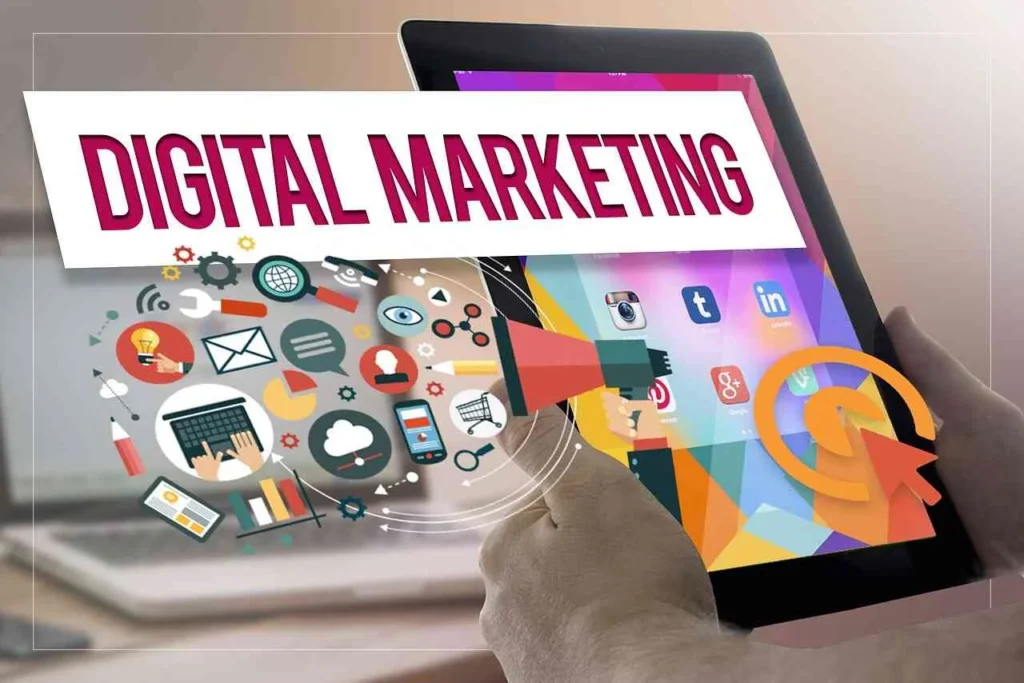Digital marketing has become an essential part of any business strategy. With the rise of the internet and social media, it’s crucial to understand the different types of digital marketing and how they can benefit your brand. In this article, we’ll break down the 9 types of digital marketing in a simple, engaging way, using real-world examples to make the concepts easy to understand.

What is Digital Marketing?
Digital marketing is the practice of using the internet and electronic devices to promote products, services, or brands. It involves reaching and connecting with people through online platforms like websites, social media, emails, search engines, and mobile apps. The goal of digital marketing is to attract potential customers, build relationships, and encourage them to take actions like buying a product, signing up for a newsletter, or visiting a website.
Table of Contents
What Are the 9 Types of Digital Marketing?

1. Content Marketing
Content marketing focuses on creating and distributing valuable, relevant content to attract and engage a target audience. This can include blog posts, videos, podcasts, infographics, and more. The goal is to build relationships and drive customer action.
Why Use Content Marketing?
Content marketing is effective because it doesn’t directly promote a product or service. Instead, it provides useful information that helps solve problems, builds trust, and positions your brand as an expert in the field.
Real-Life Example:
Imagine you own a fitness brand. Instead of just promoting products, you create blog posts on topics like “Top 10 Exercises for Weight Loss” or “How to Stay Motivated at the Gym”. This helps your audience see you as a helpful resource rather than just a seller.
Learn more about content marketing

2. Search Engine Optimization (SEO)
SEO is the process of optimizing your website to rank higher on search engine results pages (SERPs). The better your SEO, the more organic traffic you can generate.
Key Elements of SEO:
- On-Page SEO: Optimizing individual pages for keywords and meta descriptions.
- Off-Page SEO: Building backlinks from reputable sites.
- Technical SEO: Ensuring your website runs smoothly, with fast loading times and mobile-friendliness.
3. Social Media Marketing (SMM)
Social media marketing involves using platforms like Facebook, Instagram, Twitter(X), and LinkedIn to promote your products and engage with your audience.
Why It Works:
Social media allows you to directly interact with customers and build a community around your brand.
Pro Tip:
Create a content calendar to consistently post valuable content and engage with your audience.
Explore social media marketing strategies
4. Email Marketing
Email marketing is about sending personalized messages directly to potential or existing customers. It’s a great way to nurture leads and build relationships.
Example:
Send a welcome email series to new subscribers, introducing your brand and offering exclusive discounts.
Discover what is Email marketing and how does it work briefly
5. Pay-Per-Click (PPC) Advertising
With PPC, advertisers pay each time someone clicks on their ad. This is a quick way to drive traffic and generate leads.
Popular Platforms:
- Google Ads
- Facebook Ads
- LinkedIn Ads
Learn more about PPC
6. Affiliate Marketing
Affiliate marketing involves partnering with individuals or companies who promote your products in exchange for a commission on sales.
Tip:
Choose affiliates with an audience that matches your target market for better results.
Read more on affiliate marketing
7. Influencer Marketing
Working with influencers helps you reach a broader audience. Influencers already have the trust of their followers, making it easier to market your product.
Example:
A fashion brand collaborating with an Instagram influencer to showcase their new collection.
Discover influencer marketing tips
8. Performance Marketing
Performance marketing focuses on measurable results, such as clicks, leads, or conversions. It’s cost-effective since you only pay when the desired action occurs.
Understand performance marketing
9. Multichannel Marketing
Multichannel marketing uses various platforms to reach customers. For example, using email, social media, and content marketing together to maximize reach.
Benefit:
It ensures your message is consistently delivered through multiple touchpoints.
Learn about multichannel marketing
Conclusion
Understanding the 9 types of digital marketing helps you choose the right strategy for your brand. Whether it’s content marketing to build trust or PPC for immediate traffic, each type serves a unique purpose. Start implementing these strategies today to boost your online presence!
For more insights, visit our digital marketing resource page.
FAQs about Types of Digital Marketing
How Do Landing Pages Integrate with Different Digital Marketing Types?
Landing pages are essential in digital marketing because they help convert visitors into leads or customers. These pages are specifically designed to encourage users to take a specific action, like signing up or making a purchase. Different digital marketing types use landing pages in various ways, such as:
- Content Marketing: Guides users from informative content to actionable offers.
- SEO: Attracts organic traffic to optimized landing pages.
- PPC: Directs paid traffic to pages focused on conversions.
- Social Media Marketing: Drives visitors to pages with targeted offers.
- CRO: Improves landing page elements to increase conversions.
By integrating landing pages into different marketing strategies, businesses can enhance user engagement, lead generation, and overall campaign success.
When and How Should You Use Different Digital Marketing Strategies?
The effectiveness of digital marketing strategies depends on your business stage and goals. For startups aiming to grow their audience quickly, methods like SEM, social media marketing, and influencer collaborations work well.
As your business becomes more established, focus on building customer loyalty with valuable content, email marketing, and SEO-optimized materials to maintain organic traffic. To further enhance your skills, consider professional training to develop a comprehensive marketing strategy.
What is the most effective type of digital marketing?
The effectiveness of digital marketing methods depends on the business niche and target audience. However, strategies like SEO, social media marketing, and paid advertising are commonly effective for driving traffic and boosting engagement.
How can small businesses benefit from digital marketing?
Digital marketing helps small businesses grow by enhancing brand awareness, attracting targeted traffic, and building customer relationships through cost-efficient methods like local SEO, social media campaigns, and email marketing.
How do you measure the success of a digital marketing campaign?
Campaign success is evaluated using metrics such as conversion rate, customer engagement, sales growth, and social media interactions. Analyzing these data points helps assess the campaign’s impact and ROI.
What are the common challenges in digital marketing?
Digital marketing challenges include adapting to evolving algorithms, balancing budget constraints, creating engaging content, and managing data privacy. Staying updated and using data-driven strategies can help overcome these hurdles.
